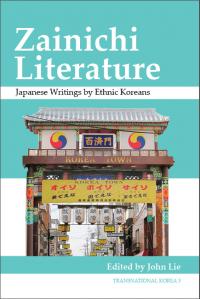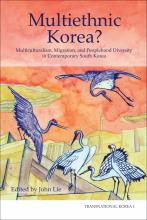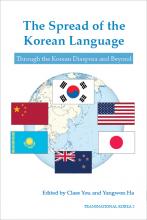Zainichi Literature
Zainichi Literature
John Lie, ed.
This collection of translated works highlights a selection of writings in translation by Zainichi (diasporic Koreans in Japan). The introduction provides an historical overview of Zainichi diasporic identity; the concluding appendix considers the figure of Kin Kakuei and the flourishing Zainichi literature in the 1960s. Authors whose works are translated and appear in this volume include: Kim Saryang, Kim Talsu, Yang Sŏgil, Lee Jungja, Won Soo-il, Oka Masafumi, and Yū Miri.
As a nonprofit academic press, we need your support to publish our books. Your gift can help us make more of our titles available as e-books. DONATE NOW
Title information
This collection of translated works highlights a selection of writings in translation by Zainichi (diasporic Koreans in Japan). The introduction provides an historical overview of Zainichi diasporic identity; the concluding appendix considers the figure of Kin Kakuei and the flourishing Zainichi literature in the 1960s. Authors whose works are translated and appear in this volume include: Kim Saryang, Kim Talsu, Yang Sŏgil, Lee Jungja, Won Soo-il, Oka Masafumi, and Yū Miri.
Contributors:
Haeng-ja Chung is a cultural anthropologist. She received her PhD from the Department of Anthropology at the University of California, Los Angeles. She is an associate professor at Okayama University. Before joining Okayama University, she taught at Colorado College, Hamilton College, and Smith College in the United States. She also conducted research on the intersection of gender and ethnicity as a postdoctoral fellow at Harvard University and University of Tokyo. She has given numerous lectures and has published in both English and Japanese. Her publications include “Transnational Labor Migration in Japan: The Case of Korean Nightclub Hostesses in Osaka,” “‘THAT’S IT?’ How Conflicts and Confusion are Negotiated in the Globalized Contact Zone of a ‘Japanese’ Club,” and “In the Shadows and at the Margins: Working in the Korean Clubs and Bars of Osaka’s Minami Area.”
Nathaniel Heneghan is a visiting assistant professor in the department of East Asian Studies at Oberlin College. His research encompasses topics of modern Japanese literature and visual media, transnational and postcolonial theory, pop and subculture mediums, and gender and ethnic studies. He is currently at work on a manuscript that considers the changing representation of Zainichi Korean identity in postwar literature and film.
Nayoung Aimee Kwon is an associate professor of Asian and Middle Eastern Studies, the Program in the Arts of the Moving Image, and the Program in Gender, Sexuality, and Feminist Studies at Duke University. Her publications include Intimate Empire: Collaboration and Colonial Modernity in Korea and Japan (Duke University Press, forthcoming in Korean from Somyŏng Press) and a coedited volume Transcolonial Film Coproductions in the Japanese Empire: Antinomies in the Colonial Archive. She is currently translating Kim Saryang’s works into English and editing a transnational volume of critical works about his legacy.
John Lie teaches social theory at the University of California, Berkeley. He has written Multiethnic Japan (Harvard University Press, 2001) and Zainichi (Koreans in Japan): Diasporic Nationalism and Postcolonial Identity (University of California Press, 2008).
Youngmi Lim is an associate professor of sociology at Musashi University, Tokyo. She received her PhD in sociology from the City University of New York (CUNY) Graduate Center and has taught at various CUNY campuses for ten years. She is currently writing a book on Japanese and Zainichi intermarriages.
Samuel Perry is an associate professor of East Asian studies at Brown University. His research brings together the fields of modern literature, translation, and cultural history as he seeks to understand the strategies by which marginalized people have contested dominant cultures in East Asia. His published work includes Recasting Red Culture in Proletarian Japan: Childhood, Korea, and the Historical Avant-Garde (University of Hawai‘i Press, 2014), and two books of translation from Korean and Japanese, From Wŏnso Pond by Kang Kyŏng-ae (Feminist Press, 2009) and Five Faces of Japanese Feminism: Crimson and Other Works by Sata Ineko (University of Hawai‘i Press, 2016). He is currently writing a monograph about Japanese literature at the time of the Korean War and translating a collection of queer Korean literature.
Abbie (Miyabi) Yamamoto received her PhD in Japanese and Korean literature from the University of California, Berkeley, in 2011. She currently lives in San Diego and works as a translator and cultural consultant. Her latest research project, Girls Who Become Mothers…Or Not: Young Women and Sexuality in Twentieth-Century Japan, focuses on the Japanese shōjo (young woman) figure and how it has changed over the course of the twentieth century.
Christina Yi is an assistant professor of modern Japanese literature at the University of British Columbia. She received her PhD in modern Japanese literature from Columbia University. In 2011, she was awarded the William F. Sibley Memorial Translation Prize for her translation of Kim Saryang’s “Pegasus” (Tenma). Her research focuses on the rise of Japanese-language literature by Korean colonial subjects during the 1930s and 1940s and its subsequent effect on discourse regarding “national” and “ethnic minority” literature in postwar Japan and Korea.
John Lie, ed.
John Lie (pronounced "Lee") is professor of sociology at the University of California, Berkeley. He studies Korean diasporic trajectories and rethinks the categories of modern peoplehood. His recent works include Zainichi (Koreans in Japan): Diasporic Nationalism and Postcolonial Identity (UC Press, 2008) and an edited volume, Multiethnic Korea? Multiculturalism, Migration, and Peoplehood Diversity in Contemporary South Korea (IEAS, 2015).
A.B. in Social Studies, Harvard University; Ph.D. in Sociology, Harvard University
Zainichi Literature (TK 3)
Preface vii
Contributors ix
Introduction 1
John Lie
1. Two Essays: “Letter to Mother” and “Colonial Koreans
and Peninsulars” 25
Kim Saryang, translated by Nayoung Aimee Kwon
2. Trash 35
Kim Talsu, translated by Christina Yi
3. In Shinjuku 55
Yang Sŏgil, translated by Samuel Perry
4. Selected Poems from Nagune Taryong: Eternal Traveler 67
Lee Jungja, translated by Haeng-ja Chung
5. Lee-kun’s Blues 121
Won Soo-il, translated by Nathaniel Heneghan
6. Selected Poems from I Am Twelve 139
Oka Masafumi, translated by Youngmi Lim
7. Specimens of Families 165
Yū Miri, translated by Abbie (Miyabi) Yamamoto
Appendix 183
John Lie
|
JOURNAL REVIEWS |
|
"No longer a postcolonial phenomenon, these samples of Zainichi literature strike universal chords about the need to create and believe in a home, a sentiment wistfully rendered in 'Nagune Taryong: Eternal Traveler,' a collection of tanka poems by Lee Jungja: 'On the verge of my wandering heart/ I attempt to love/ Japan’s wind.'" ~Nicolas Gattig, in The Japan Times. (https://www.japantimes.co.jp/culture/2019/05/25/books/book-reviews/zainichi-literature-review-nature-exile/#.Xadp5ehKjmZ) |



